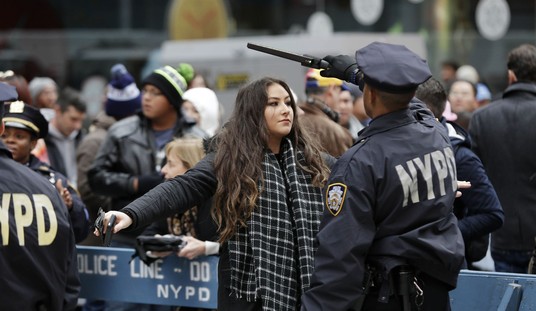Georgi Plekhanov regarded individuals as little weights marching to the end of a see-saw impelled by some Law of History. When enough of these ants got far enough along the moment arm, the see-saw would fall as ordained. He would no doubt have asked himself whether the Arab Spring would have happened, or taken a different course, without Mohammed Bouazizi.
Bouazizi, says Daniel Pipes, was a 26-year old fruit vendor in Tunisia who supported an extended family of 8 people by selling apples in the marketplace. Every day a couple of beat cops took apples from him on the arm. Finally day his uncle complained to a police chief about it, but that was only the beginning and not the end of his problems.
The police chief told off the beat cops and one of them, a policewoman, decided to teach the troublemaker a lesson. She calmly went to his fruit stall and started loading his fruit into her car. And she kept loading and loading. Then she took away his weighing scale. When the impoverished vendor pleaded with her to stop, she beat him with a baton and slapped him in the face. An Arab man being beaten by an Arab woman in a public place. Bouazizi went down to the town hall and looked in vain for someone with whom he could lodge a complaint.
No, he was told: Everyone is in meetings. Go home. Forget it. Rather than let the matter go, however, he went to his fellow vendors and announced his intent to protest the injustice and corruption by setting himself on fire. True to his word, he doused himself with an inflammable liquid at 11:30 a.m., applied a match, and burst into flames.
Bystanders eventually put out the fire. But it was too late. The vendor was burned over large parts of his body. It took him 18 days to die.
But by that time his story had touched a chord. Political movements took up his story, perhaps adding a little here and a little there, but doubtless conscious they were dealing with an anecdote that spoke to the man in the Arab Street. Five thousand people attended his funeral. In two weeks President Zine El Abidine Ben Ali had left the country. The Arab Spring had begun.
The common face of totalitarianism is not, as cinema often depicts, that of uber-Nazis marching in satanic rows, or of cultured madmen planning the extinction of millions with violin music softly seething in the background. Its quotidian face is one of petty, arbitrary, unappealable abuse. For the average man life under tyranny consists of being precisely zero in a society that can do anything — anything at all — to him.
And usually the average man simply tries to forget. There is family, home, the television. There is drink. But for Mohammed Bouazizi, watching his pitiful baskets of fruit and cheap weighing scale being carted away and slapped as he groveled in the dust, there was no escape from reality into illusion. At that moment he knew exactly what he was. Not a man, nor even the mockery of a man. He was nothing. When city hall told him, “everyone is in meetings. Go home. Forget it,” he knew exactly what they meant.
If the “shot heard round the world” was fired at Concord, the cry of pain which set the Middle East aflame was uttered in Tunisia. One of Plekhanov’s ants had reached the magic line on the moment arm, and the slow movement began. But what did Bouazizi assert so emphatically by his immolation? Was it the lack of a “decent livelihood” or lack of access to Facebook? Earlier this year, Eric O’Keefe described the response of Levi Preston, the last survivor of the Battle of Concord at a speech to a Tea Party crowd. Preston was 91 and asked at school talk in 1842 why he and his fellows had fought the British. The teacher, Mellen Chamberlain, received a surprising answer.
He did not speak, for example, of the “intolerable oppressions” of British rule that Chamberlain had heard so much about.
“Oppressions?” Preston said. “I didn’t feel them.”
“Well,” Chamberlain said, “were you not oppressed by the Stamp Act?”
“I never saw one of those stamps,” Preston said. “I never paid a penny for one of them.”
“Well, what about the tea tax?”
“Tea tax! I never drank a drop of the stuff. The boys threw it all overboard.”
“Then I suppose you had been reading Locke on the principles of liberty?”
“Never heard of ‘im,” Preston said. “We only read the Bible and the Almanac.”
“Well, then,” Chamberlain asked, “why did you fight?”
And here’s where Preston summed up the crisis of his time.
“Young man, what we meant in going for those redcoats was this: We always had governed ourselves, and we always meant to. Those people did not believe we should.”
Bouazizi on that final day wanted to become something that his society would not allow. The desire for self-possession is a very powerful impulse. Causes like low-cost housing, the dole or state-paid education can be less impelling than the desire not to be controlled, than the need not to be humiliated. People don’t like to be told what to do, especially if they already know how to order their affairs. As Levi Preston explained, he did not fight for a political theory or to gain tax advantages; he was at Concord to limit the power of a regime over himself. He stood at the bridge because he wanted, in his words, to govern himself.
In the days that followed Bouazizi’s death, a number of copycat events took place all over the Middle East.
Mohsen Bouterfif, a 37-year-old father of two, set himself on fire when the mayor of Boukhadra refused to meet with him and others regarding employment and housing requests on January 13, 2011. According to a report in El-Watan, the mayor challenged him, saying if he had courage he would immolate himself by fire as Bouazizi had done.
He died on January 24. Maamir Lotfi, a 36-year-old unemployed father of six who was denied a meeting with the governor, burned himself in front of the El Oued town hall on January 17. He died on February 12.
Abdelhafid Boudechicha, a 29-year-old day laborer who lived with his parents and five siblings, burned himself in Medjana on January 28 over employment and housing issues. He died the following day.
In Egypt, Abdou Abdel-Moneim Jaafar, a 49-year-old restaurant owner, set himself alight in front of the Egyptian Parliament. His act of protest contributed to the instigation of weeks of protest and, later, the resignation of Egyptian President Hosni Mubarak on February 11, 2011. In Saudi Arabia, an unidentified 65-year-old man died on January 21, 2011, after setting himself on fire in the town of Samtah, Jizan. This was apparently the kingdom’s first known case of self-immolation.
Whether any of the subsequent unrest would have happened without the Tunisian fruit vendor’s dramatic action is an open question. Louis Menand argued that we all like to believe that our lives make a difference. Because if nothing we do really changes things then our freedom wouldn’t be real. We only have the freedom of ants; and our only honor that of being the first insect to cross the line.
“There is history the way Tolstoy imagined it, as a great, slow-moving weather system in which even tsars and generals are just leaves before the storm. And there is history the way Hollywood imagines it, as a single story line in which the right move by the tsar or the wrong move by the general changes everything. Most of us, deep down, are probably Hollywood people. We like to invent “what if” scenarios–what if x had never happened, what if y had happened instead?–because we like to believe that individual decisions make a difference: that, if not for x, or if only there had been y, history might have plunged forever down a completely different path. Since we are agents, we have an interest in the efficacy of agency.”
If the evidence of totalitarian behavior means anything, then tyrants as a whole act like individuals matter. They don’t believe in ants. They fear men. Their entire apparatus of control is designed entirely to suppress individuals, lest one act of solitary freedom touch off a blaze. Although it was Anatoly Rybakov, in his book, Children of Arbat, who attributed to Stalin words he never said: “death solves all problems — no man, no problem”, Stalin himself said something similar. He regretted that Ivan the Terrible showed any mercy to women or children.
One of Ivan the Terrible’s mistakes was to overlook the five great feudal families. If he had annihilated those five families, there would definitely have been no Time of Troubles. But Ivan the Terrible would execute someone and then spend a long time repenting and praying. God got in his way in this matter. He ought to have been still more decisive!
There in different words is the same message. “No man, no problem.” In Stalin’s universe the answer to all Mohammed Bouazizis would be to cause their death before they caused trouble. What a tribute by the Locomotive of History to one of Plekhanov’s ants. For one thing, ants never self-consciously stand at bridges or set fire to themselves.
“No Way In” print edition at Amazon
Tip Jar or Subscribe for $5










Join the conversation as a VIP Member